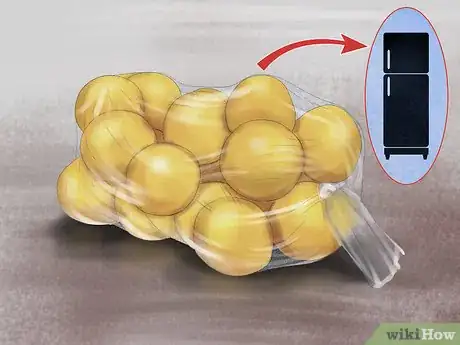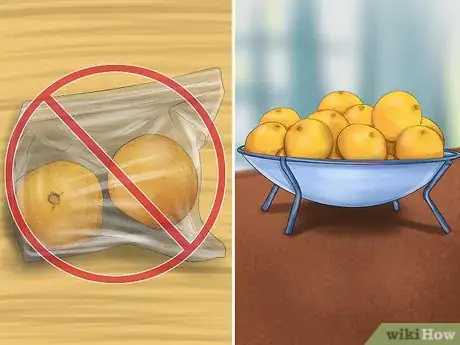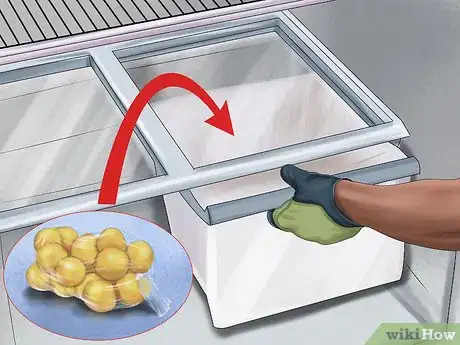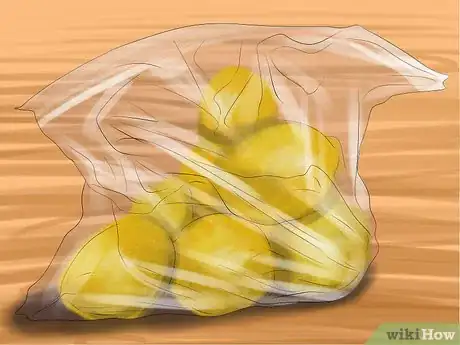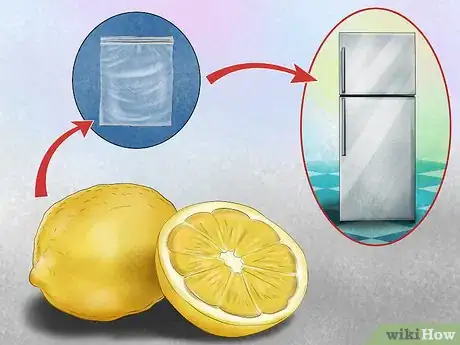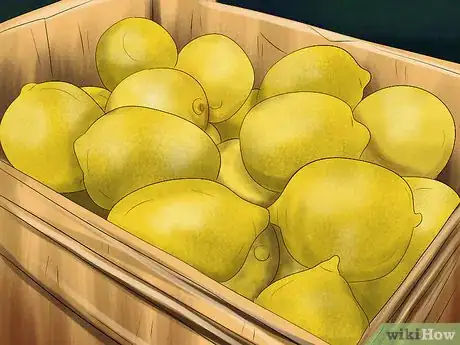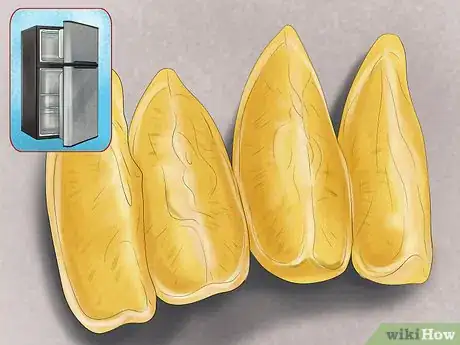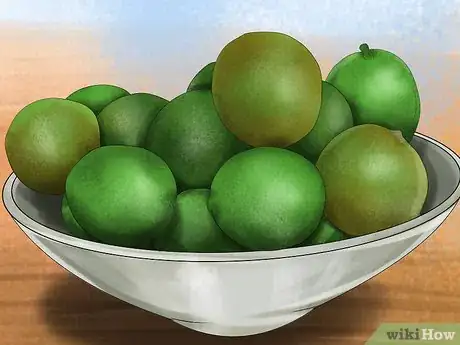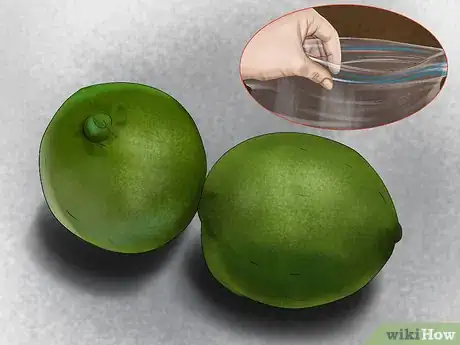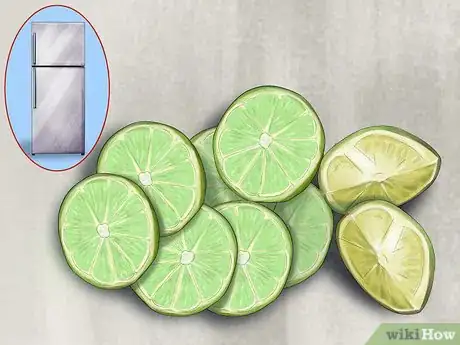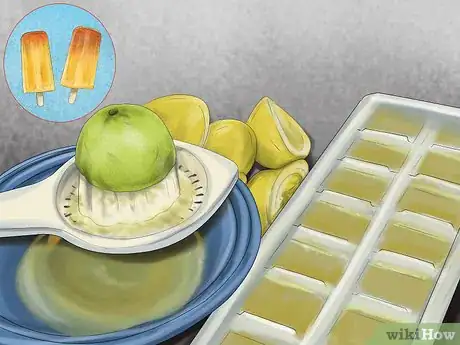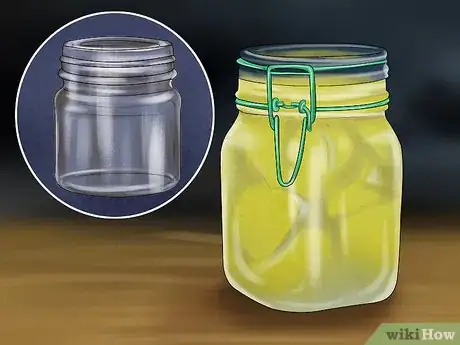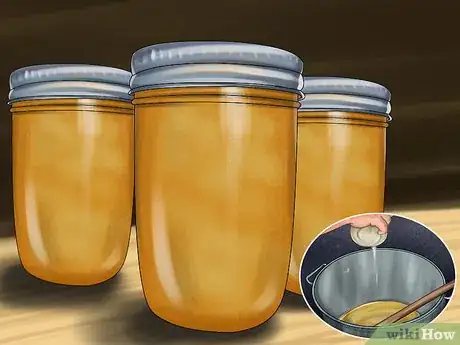This article was co-authored by wikiHow Staff. Our trained team of editors and researchers validate articles for accuracy and comprehensiveness. wikiHow's Content Management Team carefully monitors the work from our editorial staff to ensure that each article is backed by trusted research and meets our high quality standards.
There are 12 references cited in this article, which can be found at the bottom of the page.
This article has been viewed 68,659 times.
Learn more...
Storage methods for citrus fruit vary based on the type of citrus you wish to keep preserved, how long they need to be kept fresh and they way you intend to serve them. Properly storing citrus fruit can ensure that you retain the nutritional value, flavor and juiciness of this unique fruit.
Steps
Checking the Quality
-
1Check all citrus fruits for ripeness. Fruit that is over ripened will deteriorate quickly as it has already released much of the chemicals that cause the fruit to break down. Fruit that is under ripened will not have developed all of its sweetness, nutritional value and juice content. Properly ripened fruit will keep longer.
- Unlike other fruits, citrus fruits do not continue to ripen once they have been picked. So it is important that they be ripe right off of the tree.[1]
- Ripened fruit will have very bright and vibrant colors. A fully ripened citrus fruit will have reached the fullness of its color. Dull looking fruit can indicate over ripeness and oranges with an abundance of greenish skin can mean that the fruit is under ripened.
- A bit of green on the skin of oranges and lemons is perfectly fine. These tend to keep the longest and will be perfect for storing.
-
2Purchase fresh citrus. Once a fruit has been picked, it gradually begins to break down. Much of the fruit in grocery stores have already been transported and stored for a week or more. Your best bet is to obtain the fruit as soon as possible after it has been harvested.
- Farmers markets, as well as other markets that sell locally harvested produce tend to offer fresher citrus fruits due to the fact that they are often delivered straight from the harvest.
Advertisement -
3Pick your own fruit. If you are picking the fruit from the tree yourself, properly ripened fruit should be easily clipped from the tree with very little resistance. Any struggle to pull the fruit from the tree means that it isn’t quite ready to pick. By determining its freshness right from the tree, you will stand a good chance at finding the ideal fruit for storage.
Storing Oranges
-
1Store them in the refrigerator. Oranges tend to preserve best at cooler temperatures and deteriorate quickly at warmer temperatures. Keeping them refrigerated will slow down the deterioration process and will help to maintain freshness for an extended period of time.[2]
- Using a mesh or otherwise well-ventilated bag will keep the air circulating around the fruit. This will help to prolong the occurrence of mold, lesions or softened produce.
- Store them in your refrigerator’s vegetable bin and be sure to rotate the fruit regularly to maintain airflow.
- Oranges stored in a refrigerator should keep for approximately one month.
-
2Keep them on the counter. Oranges kept on a kitchen counter or a table will remain fresh for up to one week at room temperature, depending on how fresh they were to begin with.[3] If your room temperature tends to be on the warmer side, try keeping the home cooler, or placing the fruit bowl into the fridge at night.
- Do not cover the bowl with plastic wrap or foil. Airflow is important to keeping oranges fresh.
-
3Keep them dry. Damp oranges that have been stored may quickly become moldy. Ensure that there is no moistness or water droplets on the skin of the fruit.
- If they arrive damp, so be sure to towel dry and air them out before storing.
Storing Grapefruit
-
1Store them on the counter. Grapefruit is best stored in a bowl on the counter if you intend to eat them within the first week. Due to its heaviness, the grapefruit does bruise easily, so be sure to stack them evenly.
-
2Put them into your refrigerator’s vegetable bin. If you plan to keep your grapefruit for up to 3-4 weeks, be sure to store them in a low-humidity crisper drawer.[4]
- Similar to oranges, grapefruit should be placed into a mesh or otherwise well-ventilated storage bag. Grapefruit need good air circulation to prevent perspiration and moldy conditions. Be sure to rotate them twice per week.
-
3Freeze your grapefruit. Peel and freeze them whole, or in sections inside of Ziploc freezer bags or Tupperware. Frozen grapefruit will keep up to six months.
Storing Lemons
-
1Seal them in a Ziploc bag and refrigerate. This is considered the best method which preserves fresh lemons for up to four weeks and will also retain their juiciness during that time.[5]
-
2Keep them in the pantry. Lemons will remain fresh for approximately 5-7 days when left at room temperature. After that time, they will begin to lose moisture, dry out and harden.[6]
-
3Freeze them. Lemons can be cut into quarters, with all membranes and seeds removed. Place them into plastic bags and freeze. Use them within three months as the longer they are stored, the more bitter they become.[7]
- If you regularly use lemon slices for water or tea, you can freeze lemon slices by laying them out on a cookie sheet and setting them in the freezer for a few hours. Once they are solid, place them into a ziploc storage bag.[8]
Storing Limes
-
1Store at room temperature. Limes generally have a long shelf-life. Unlike oranges or lemons, fresh limes can last up to 2-3 weeks at room temperature.[9]
- Storing limes at room temperature also allows them to yield more juice.
-
2Seal and refrigerate. Refrigerated limes can be placed into a loosely sealed ziploc bag and will keep for up to 4 weeks.
- Unlike orange or yellow citrus fruits, limes will begin to turn brown as they age. Limes that are mostly brown are considered moldy and should not be eaten.[10]
-
3Freeze your limes. Wash, peel and cut fruit into sections, removing membranes and seeds. Freezing whole limes may result in a mushy texture when thawed.
Preserving Citrus for Multiple Uses
-
1Freeze fresh citrus juice. Cut open fruit and squeeze juice into ice cube trays to make popsicles or add to meals for additional flavoring.
- Use frozen lime juice to preserve guacamole or any other dishes with avocado to keep it from spoiling.
- Frozen lemon juice can be added to fish before baking for a delicious citrusy taste.
- Frozen orange juice popsicles are a great way for kids to get their much-needed serving of vitamin C.
-
2Pickle your citrus fruits. Pickling is a great way to preserve and even enhance the taste of citrus fruit. Oranges, lemons and limes are often packed into an airtight jar and are pickled using salt and water.
- Rinse the lemons and dry them before you begin. Using a shape knife, make a lengthwise cut in the lemon. You do not want to cut all the way through — your aim is to create slits into which you can pack salt and spices, not to chop the lemon up. Make four incisions like this.[11]
- Fill the sliced openings with Kosher, pickling or sea salt at about one tablespoon per lemon. Put the lemon into a clean quart-sized Mason jar. Continue to add salted lemons until the the jar is almost full, mashing them down so they fit.[12]
- At this point you may add some spices and/or herbs such as cinnamon, cloves or bay leaves.
- Seal the jars tightly and wait at least 3 weeks before eating they can be kept up to 6 months
- Pickled fruit is usually paired with fish, in salads and with rice.[13]
-
3Can your citrus fruits. Canning can preserve citrus fruits for up to nine months.[14] A quart jar can hold the segments of about 3 large oranges or 4 lemons.
- To can a citrus fruit, remove peel, seeds and membrane from the fruit and break the fruit up by its segments (pieces).[15]
- Bring to a boil six cups of water, along with sugar, sugar syrup or fruit juice.
- Fill your up your jar with the citrus fruit.
- Once the mixture has come to a boil, carefully pour it into the jar, over the fruit. Do not allow the mixture to cool before pouring.
- Seal the jar and submerge it in a hot, boiling water bath for 10 minutes.
- After boiling, lift the jar from the water and allow it to cool.
Community Q&A
-
QuestionCan I freeze oranges or tangerines?
 Community AnswerGenerally speaking, citrus does not hold up well to freezing. The water content is too high and causes breakdown of the membranes in the fruit.
Community AnswerGenerally speaking, citrus does not hold up well to freezing. The water content is too high and causes breakdown of the membranes in the fruit. -
QuestionCan I freeze oranges?
 Maggie PetersonCommunity AnswerYes, you can freeze oranges. Peel them, section them, and then store each sectioned orange in a plastic freezer bag in the freezer until you are ready to eat/use them.
Maggie PetersonCommunity AnswerYes, you can freeze oranges. Peel them, section them, and then store each sectioned orange in a plastic freezer bag in the freezer until you are ready to eat/use them.
Warnings
- Do not use airtight or Ziploc bags to store your fruit. Little to no air flow makes the fruit perspire and contributes to mold growth.⧼thumbs_response⧽
- Do not eat citrus fruits with green or whitish mold. Throw away immediately and be sure to clean any areas that the mold has touched.⧼thumbs_response⧽
- Freeing the entire fruit will result in a mushy texture, but the fruit may still be used for juicing.⧼thumbs_response⧽
References
- ↑ http://www.gettystewart.com/how-to-select-and-store-citrus-fruit/
- ↑ http://shelflifeadvice.com/content/how-should-citrus-fruits-be-stored
- ↑ http://shelflifeadvice.com/content/how-should-citrus-fruits-be-stored
- ↑ http://www.finecooking.com/articles/how-to-buy-cook-grapefruit.aspx
- ↑ https://www.thekitchn.com/the-best-way-to-keep-lemons-fresh-for-a-whole-month-tips-from-the-kitchn-144430
- ↑ https://www.cooksillustrated.com/how_tos/5714-preserving-lemons
- ↑ http://www.gettystewart.com/how-to-select-and-store-citrus-fruit/
- ↑ http://www.gardenbetty.com/2012/02/freezing-fresh-lemon-slices-lemon-juice-and-lemon-zest/
- ↑ http://www.eatbydate.com/fruits/fresh/how-long-do-limes-last/
- ↑ http://www.whfoods.com/genpage.php?tname=foodspice&dbid=27
- ↑ http://honest-food.net/2010/02/04/preserving-lemons/
- ↑ http://honest-food.net/2010/02/04/preserving-lemons/
- ↑ http://www.homepreservingbible.com/1105-food-preservation-methods-for-citrus-fruits/
- ↑ http://www.motherearthnews.com/real-food/ideas-for-preserving-citrus-fruit-zbcz1502
- ↑ http://www.motherearthnews.com/real-food/ideas-for-preserving-citrus-fruit-zbcz1502



